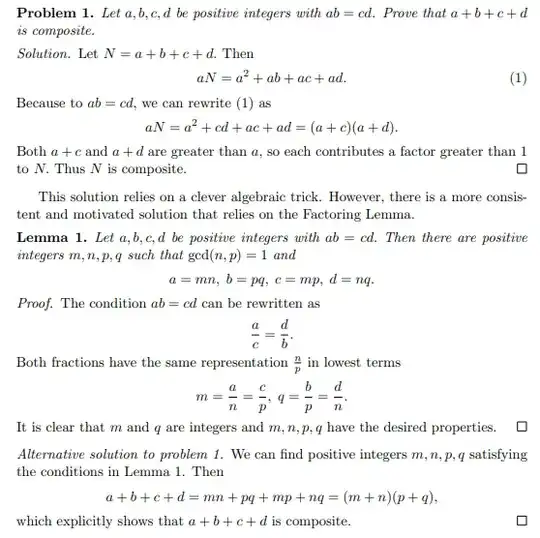Rewrite as:
$$a^2-b^2+ac-bc=bd-bc+c^2-d^2$$
$$(a-b)(a+b+c)=(c-d)(c+d-b)$$
Since $a>b>c>d$, each of $a-b, a+b+c, c-d, c+d-b$ is positive. By factoring lemma (excerpted below) there exists $w, x, y, z \in \mathbb{Z}^+$ s.t.
$$a-b=wx, a+b+c=yz, c-d=wy, c+d-b=xz$$
Solving for $a, b, c, d$, we get:
\begin{align}
5a=3wx+2yz-wy-xz \\
5b=-2wx+2yz-wy-xz \\
5c=-wx+yz+2wy+2xz \\
5d=-wx+yz-3wy+2xz
\end{align}
Thus:
\begin{align}
& 25(ab+cd) \\
& =(3wx+2yz-wy-xz)(-2wx+2yz-wy-xz) \\
& +(-wx+yz+2wy+2xz)(-wx+yz-3wy+2xz) \\
& =5(z^2-wz-w^2)(x^2+y^2)
\end{align}
$$5(ab+cd)=(z^2-wz-w^2)(x^2+y^2)$$
Since $b>c$,
$$-2wx+2yz-wy-xz=5b>5c=-wx+yz+2wy+2xz$$
$$yz>wx+3wy+3xz$$
In particular, $yz>wx+3wy+3xz>3xz$ implies $y>3x$ and $yz>wx+3wy+3xz>3wy$ implies $z>3w$.
Thus
$$x^2+y^2>x^2+9x^2>5$$
$$z^2-wz-w^2=(z-\frac{w}{2})^2-\frac{5w^2}{4}>(3w-\frac{w}{2})^2-\frac{5w^2}{4}=5w^2 \geq 5$$
If $ab+cd$ is a prime, then $ab+cd \geq 4(3)+2(1)>5$, then $5(ab+cd)=(z^2-wz-w^2)(x^2+y^2)$ implies that $ab+cd$ divides exactly 1 of $z^2-wz-w^2$ and $x^2+y^2$. However, the term not divisible by $ab+cd$ must necessarily divide $5$, and thus be $\leq 5$. Since both $z^2-wz-w^2>5$ and $x^2+y^2>5$, we obtain a contradiction.
Therefore $ab+cd$ is not prime.
Below is the linked "factoring lemma".

